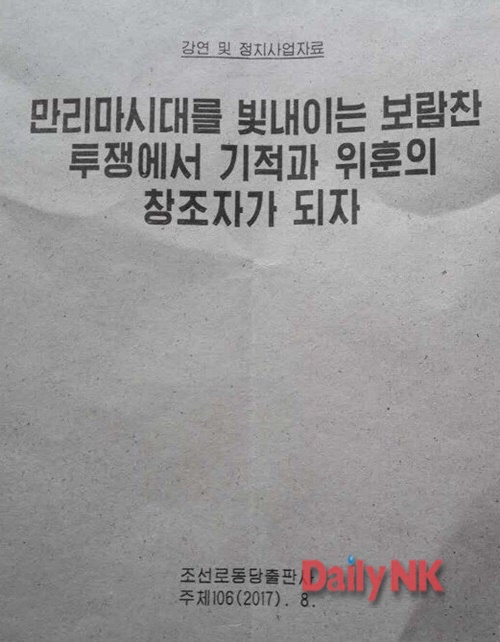
The North Korean authorities have begun offering special “Paragon” titles as an incentive in the country’s “Mallima” campaign. The term “Mallima” refers to a mythical North Korean horse purported to gallop extremely fast over great distances (10,000 ri or 3,900 km per day), and is used as a symbol to encourage the population to work hard and fast.
Daily NK recently acquired a North Korean internal-use document containing political lecture materials related to the program, titled, “Let’s become creators of miracles and great achievements through the fruitful struggle which is making the Mallima Generation shine (Korean Workers’ Party Publishing House, Juche 106 (August 2017).” The document goes on to state, “We are igniting a fever of great innovation and rapid development by recognizing model examples of those furiously blazing the trail of Mallima Speed.”
Starting with the “Chollima Movement” (which carries a similar meaning to Mallima, but refers to a slower horse, traveling approximately 1,000 km per day) in 1956, North Korea began recognizing individuals who had far exceeded their work quotas as “Leaders of Chollima,” and successful groups of workers as “Chollima Work Crews.” It remains unclear whether the new “Paragon” title indicates a status similar to those for the Chollima Movement.
“We demand that [everyone] honorably enter the ranks of the trailblazers of Mallima, who are Paragons from every sector and unit who exhibit fighting spirit and mentality,” the document states, adding, “[We will] together devote ourselves to [catching] the fever of wisdom and energy in an effort to improve the wealth and prosperity of our socialist nation.”
In all, eleven companies and organizations were recognized in the document as ‘Honorary Paragons,’ including the Sangwon Cement Union, the Pyongyang School of Medicine at Kim Il Sung University, and the Wonsan Shoe Factory.
Regarding the “Paragon” title, a defector in South Korea who was previously a high-ranking official in North Korea told Daily NK, “Businesses never received such recognition under Kim Il Sung or Kim Jong Il, but now they’re being paraded as model examples under Kim Jong Un.”
“Some businesses are being designated as ‘Paragons’ under Kim Jong Un, receiving regular deliveries of resources and other material support from the government,” he continued.
The eleven “Paragons” detailed in the document are now apparently receiving government aid.
As an example, the Wonsan Shoe Factory underwent remodeling three years ago and received four separate official on-site inspections from Kim Jong Un, who at the time even bestowed the brand name “Maebongsan” upon the factory’s products. He also claimed Wonsan as his hometown. Kangwon Province, where Wonsan is located, is thus being promoted as a symbol of the Kim Jong Un generation with slogans like, “Masikryong Speed”(referring to the name of a mountain near Wonsan) and “Kangwon Spirit.”
In contrast, other shoe factories in the country that have not received such special attention from Kim Jong Un are languishing, unable to operate due to dilapidated machinery and a lack of materials.
In 2007, after giving $8 million USD worth of materials to North Korea for use in the production of shoes, clothing, and soap, the South Korean government realized that North Korea’s factories were so outdated that they could not process the raw materials. The South Korean government then elected to purchase substandard materials from 3rd countries to replace the original aid shipment.
One defector who came to the South in 2008 said that “shoe factories in cities like Hamhung and Chongjin produce faulty products due to a lack of materials. Kim Jong Un may be helping the Wonsan Shoe Factory by giving them all sorts of materials and equipment, but the other shoe factories are being ignored.”
The circumstances are similar for the Pyongyang Medical School at Kim Il Sung University. Established in 1948, the university hospital is mostly used by the central party elite and a selection of other citizens.
It seems that these newly named “Honorary Paragons” of industry will become central figures in Kim Jong Un’s “Mallima Generation” propaganda, highlighting what he sees as his personal achievements.
The developments come on the heels of a January 2017 report from the Central Committee of the Korean Workers’ Party, where authorities announced plans for a late 2017 “’Meeting of Mallima Trailblazers’ – a reflection of the groundbreaking ‘Meeting of the Trailblazers of the Nationwide Chollima Workers’ Movement’ which established the Chollima Generation.”
The North Korean authorities have also noted that the new Mallima movement is intended to “surpass the goals of the time of Chollima and further promote the Party’s policy achievements,” emphasizing the need to increase efforts tenfold under the new slogan.
However, multiple sources inside the country report that most residents, beset by worries over making ends meet, have not been reacting with the fervor sought by the central authorities.




















